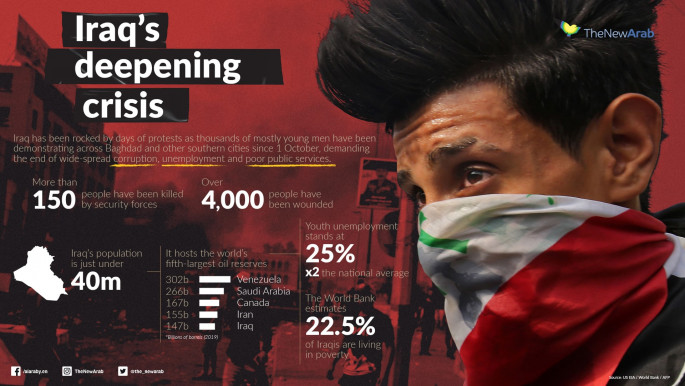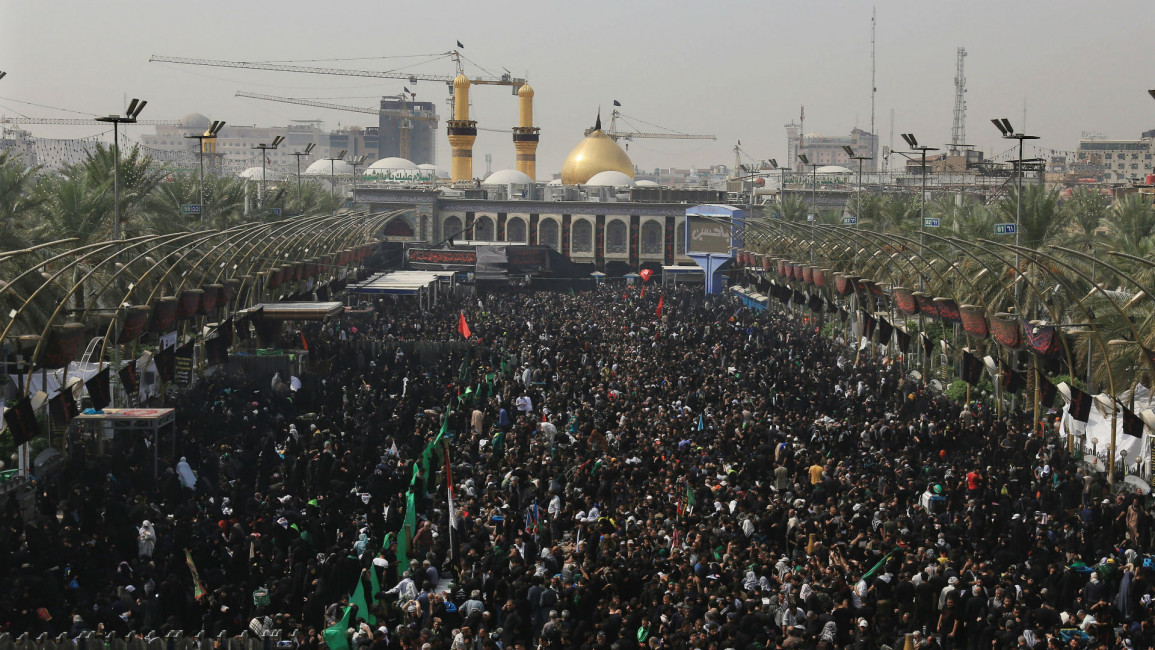'No to corruption': Iraqi pilgrims take anti-corruption protests to annual Arbaeen march
Amid the throngs of black-clad pilgrims mourning the seventh-century death of Imam Hussein, Sadr supporters dressed in white demanded "No, to corruption!" and "Yes, to reform!".
Waving Iraqi flags, they chanted "Baghdad free, corrupt ones out!"
Sadr, whose list emerged as the largest bloc in parliamentary elections last year, helped Prime Minister Adel Abdel Mahdi to form his government. But on Tuesday he called on Twitter for his supporters to march in shrouds.
Read more: Iraq's lost generation
Iraq - the second-largest OPEC oil producer - is "a rich country where the people are poor," Khedheir Naim told AFP.
Sadr hails from the southern oil city of Basra to join the world's largest Shia pilgrimage, which culminated on Saturday.
He denounced corrupt leaders, who according to official figures pocketed 410 billion euros over the past 16 years.
"Unfortunately, tyrants and criminals live handsomely at the expense of the people," Naim said.
Denouncing corruption has been a primary theme of the protest movement shaking Iraq, alongside demands for jobs and functional services.
In a single week of protests at the start of the month, 110 people were killed and 6,000 injured, according to official figures.
During the protests, unidentified armed men in uniforms raided several local television stations in Baghdad, destroying their equipment and intimidating their staff.
Journalists and activists also reported receiving threats, mostly by phone, from unidentified callers accusing them of having sided with the protesters.
Sadr wrote on Twitter that "any act of aggression (against journalists or activists)... by the state constitutes an attack on freedom of speech".
Sadr, a politician whose list won the 2018 legislative elections, helped Prime Minister Adel Abdel Mahdi form his government later that year.
But as the death toll rose in protests that rocked Iraq earlier this month, Sadr called on Adel Mahdi to resign and threatened to mobilise his supporters.
Iraqi authorities, under pressure from the streets as well as political and religious forces, increased the number of commissions to investigate the deaths.
The move came after a Friday sermon by Grand Ayatollah Ali Sistani saw the spiritual leader for Iraq's Shia majority increase the pressure on authorities.
"The government is responsible when, under the eye of law enforcement, protesters are fired on illegally and media are beaten or attacked to terrorise their employees," he said.
Sistani, who wields significant power to influence the government, gave authorities "two weeks" to release the findings of the promised investigations.
Calls have been made for fresh marches on October 25, to mark the anniversary of the government that is the focus of public anger.
The annual Arbaeen pilgrimage sees millions of worshippers from around the world visit the country to begin a walk from Najaf to Karbala, 100 kilometres (60 miles) south of Baghdad.
Arbaeen marks the end of the 40-day mourning period for the killing of Imam Hussein, grandson of the Prophet Mohammed, by the forces of the caliph Yazid in 680 AD.
Placards with anti-United States and anti-Israel messages are often seen in the crowd, though anti-corruption slogans are rare.
Despite warnings from Iranian authorities for pilgrims to delay travelling, 3.5 million people - mostly Iranians - officially entered Iraq by land borders by Friday.
Last year, more than 14 million worshippers visited the gold domed mausoleum where Imam Hussein is buried.
Follow us on Twitter: @The_NewArab



